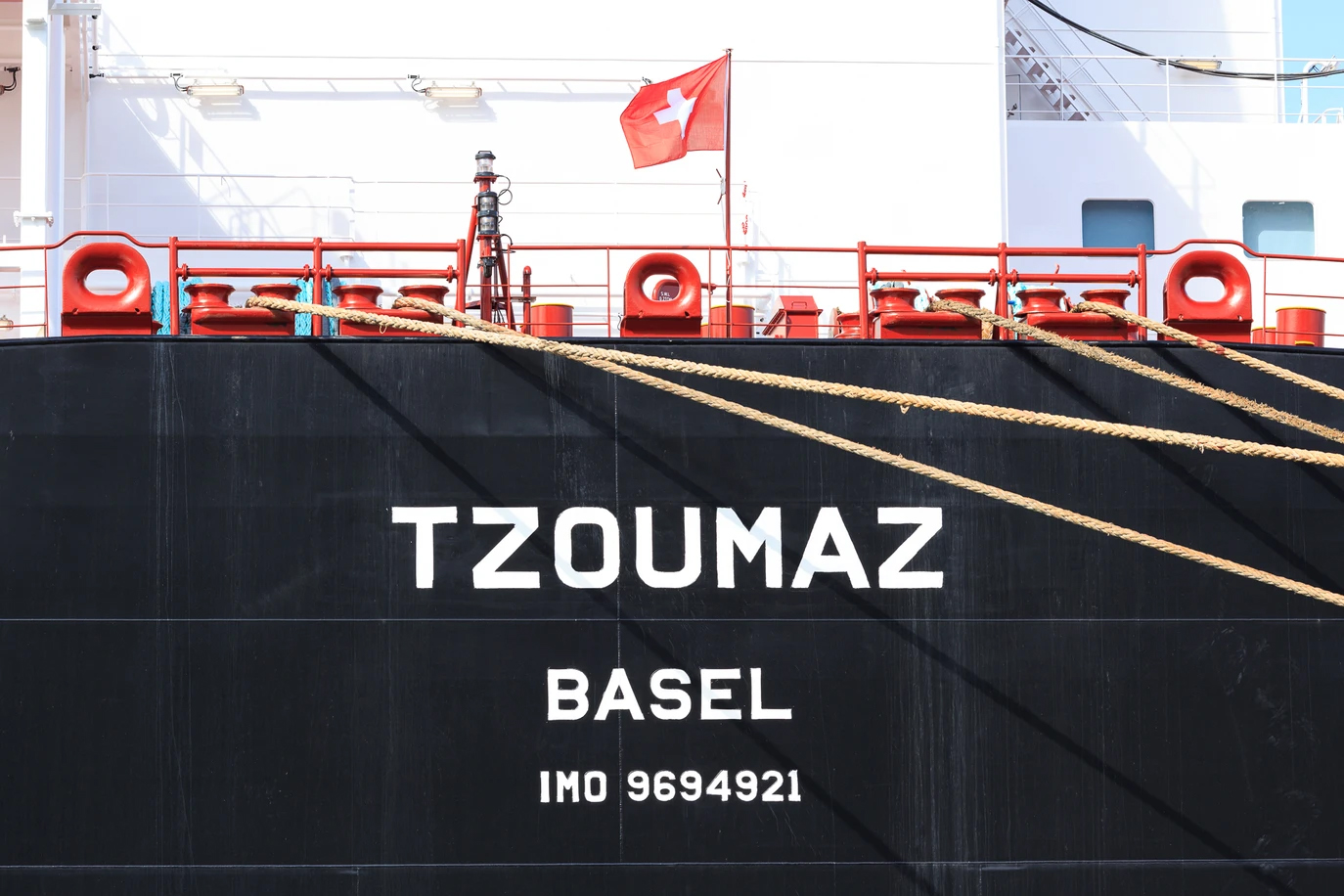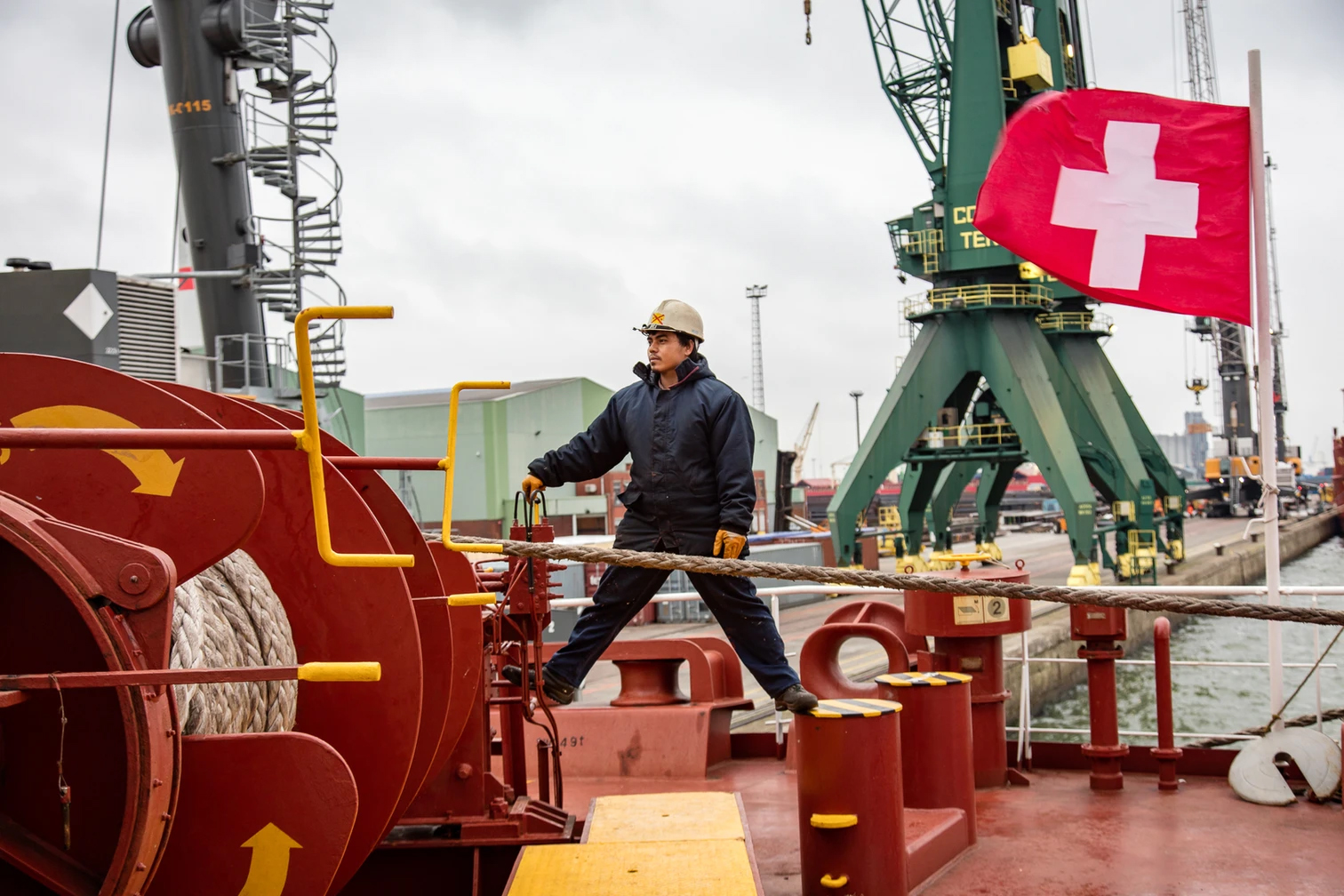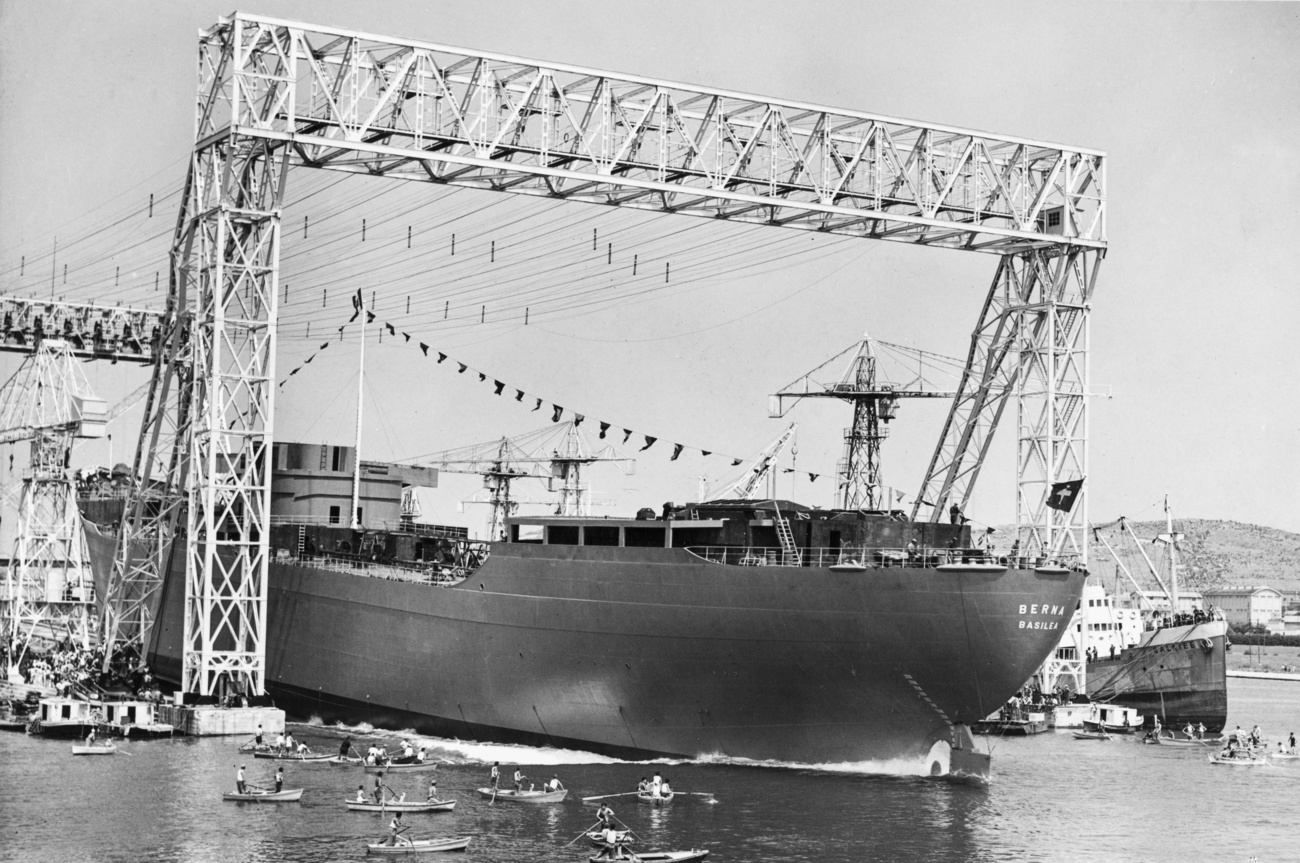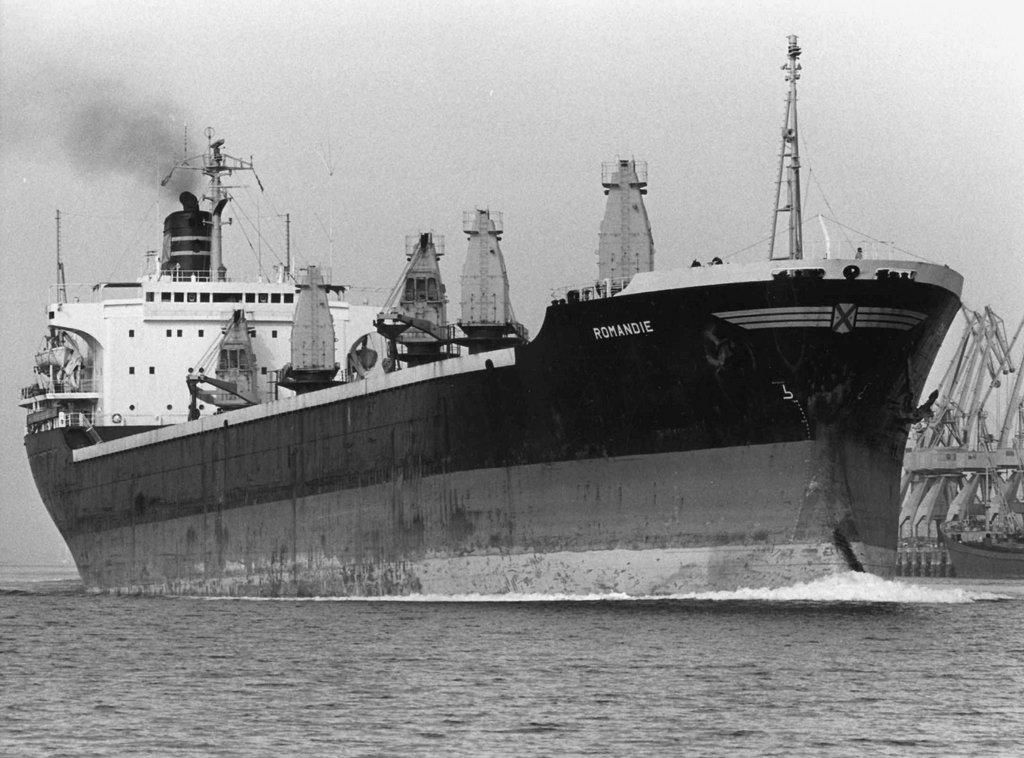Switzerland rescues its merchant fleet

Switzerland is a landlocked country and yet it boasts a merchant navy that has been flying the national flag since 1942. Today Switzerland has only 14 cargo ships, compared with 50 seven years ago. Bern wants to stem the decline.
The ships are as long as two football pitches, carry a crew of 20 and have Swiss names such as “Lavaux”, “Lausanne”, “Romandie” and “Vully”. A Swiss flag at the stern affirms their neutrality. The Swiss shipping flag was introduced by the government on April 9, 1941, to ward off hostile attacks in wartime.
Previously, Greek cargo ships had been used to supply grain, iron or coal via the port of Genoa and then by rail or road. The aim was to secure Switzerland’s supplies against German submarine attacks. Their home port was to be Basel on the Rhine River, although none of these large ships could ever anchor there because of their size. Despite these precautions, accidental gunfire from British aircraft sunk the Maloja off the island of Corsica in 1943 and hit the Chasseral at Sète in France in 1943, while the Generoso hit a German mine in the French port of Marseille in 1944. All were Swiss freighters.
Rapid decline
On its 75th anniversary in 2017, the Swiss shipping flag was still flying at the stern of 50 merchant ships belonging to six owners. Now it flies on just 14, with only two owners; one based in Zurich, and another located in Morges on Lake Geneva, near Lausanne. While there were still 611 Swiss officers and sailors on deck in 1967, they can now be counted on one hand.
“There are still two Swiss deck officers and one cadet sailing on ships under the Swiss flag,” the foreign ministry says. In addition, three officers work on foreign-flagged ships with a Swiss certificate of competence or a recognised foreign certificate. The Swiss Maritime Navigation Office (SMNO) is still located in Basel and its head has the rank of ambassador. The task of supplying Switzerland via the port of Rotterdam and then along the Rhine to Basel remains as important as ever, whether it is carried out by Swiss-flagged freighters or those of other nationalities.

For the past five or six years, the Swiss merchant navy has struggled to remain competitive. It suffered in 2017 from the fraudulent bankruptcy of a Swiss-German shipowner. This bankruptcy – which cost the government CHF215 million to cover the forced sale and loss of nine cargo ships and four chemical tankers belonging to the Bernese shipowner SLC and SCT – seriously undermined the guarantee system for ships under Swiss flags. This practice used to allow shipowners to borrow on financial markets at a favourable rate (1.5%) to enable the construction or purchase of a vessel.
The guarantee has been abandoned for new cargo ships launched after 2017, but it remains in place for vessels that benefited from it previously, even if they have since changed flags. In practice, however, Swiss shipowners have little interest in using the Swiss flag, which no longer offers financial advantages with the banks. Previously, the guarantee system had not cost the Swiss government a single franc.
Swiss flag blacklisted?
The Swiss navy has also had to adapt to safety requirements. To comply with international standards, cargo ships must undergo regular inspections by their national office. But how is this possible with only half a dozen staff in Basel and just one inspector to travel to the other side of the world?
A lack of regular checks meant cargo ships flying the Swiss flag were in danger of being blacklisted as high-risk vessels. In order to spare them this fate, the government took measures: in 2020, it preventively amended a regulation to allow ships to change flag in the event they were placed on the blacklist. The nation represented by the new flag would then carry out the regular inspections. “Measures taken to improve the safety of the Swiss flag have paid off,” the government says. “The Swiss flag has avoided the blacklist.”
“The Swiss flag remains on the grey list in the Paris Memorandum of Understanding (MoU) (editor’s note: the Paris agreement, which brings together 27 maritime nations, lists flags at risk) and has been on the white list of the Tokyo Memorandum of Understanding since 2018. As a result, the risk of the Swiss flag being placed on a blacklist remains moderate,” a foreign ministry spokesman explained in an interview with SWI swissinfo.ch.
As a direct consequence of this regulatory change, the flag of the Marshall Islands in the Paifi has largely replaced the Swiss flag. The “General Guisan”, a cargo ship belonging to the company Suisse-Atlantique, continues to sail the oceans under the Marshall Islands flag.
Parliamentary intervention
But how can this downward spiral be halted? The government took action last year. It has commissioned the foreign ministry to develop a new maritime strategy. A proposal to revise the law is to be submitted to the government this spring. A key point is the modernisation of Swiss maritime law with a series of measures to make the Swiss flag more attractive to ship owners.
At the federal level, other measures are being taken to strengthen its attractiveness. For example, the government is studying the principle of tonnage-based taxation based on the ship’s loading capacity, a more favourable principle already adopted by 21 European Union countries. This taxation is based on the loading capacity of the ship and not on the profit made. Shipping companies would therefore pay less tax.
For the time being, the government insists that keeping the Swiss Maritime Navigation Office in Basel is justified for the remaining 14 ships. The work of the Swiss office is not confined to activities related to the commercial fleet under the Swiss flag, the government says. The SMNO also handles inland navigation, the registration of ocean-going yachts (2,000 yachts) and Switzerland’s interests in international maritime forums.
Future assured?
In general, shipping remains the most efficient means of transport and Swiss shipowners remain optimistic: “Our group is doing well,” says Jean-Noël André, CEO of Suisat (short for Suisse-Atlantique). “Our strategy of investing in a young and modern fleet and our cautious approach have enabled us to withstand several years of market decline and to take full advantage of the rise in freighting rates. We have also taken advantage of our good results in recent years to reduce our debt, so we are in a solid financial position and can look ahead to the future with peace of mind”.
The upheaval in the freight market over the past two years – due in part to the disruption of supply chains caused by Covid-19 – has caused prices to soar. Prices for 12-metre containers reached over $10,000 in September 2021. They have since stabilised, but according to the latest World Container index published in February, they remain almost 40% higher than in 2019.
Geopolitical tensions are making short and medium term shipping markets nervous and volatile. In the long term, however, shipping will remain the most economical and least polluting means of transport per tonne transported per kilometre, shipowners say. Nevertheless, shipping will have to face new CO2 emission standards. Cargo ships burn heavy oil, a major pollutant emitter, and their engines never stop, even when they are stationary in a port. New, stricter standards are likely to affect the profitability of the world fleet and influence freight rates. The Swiss navy will have to manage a change in the type of ships and fuel and even propulsion systems over the next 10 to 20 years. Against this backdrop, discussions in Bern will have to ensure the profitability of the Swiss fleet.
“Having a national flag is a political decision. It is linked to a maritime strategy,” says Jean-Noël André. “The flag must be able to represent the qualitative values of Switzerland, but also be sufficiently competitive and attractive for shipowners to transfer their vessels to this flag”. The adoption of the future tonnage tax may be a solution. Parliament is currently discussing it. It will be up to the government to decide soon.
Reviewed and checked by Virginie Mangin
ds

In compliance with the JTI standards
More: SWI swissinfo.ch certified by the Journalism Trust Initiative












You can find an overview of ongoing debates with our journalists here . Please join us!
If you want to start a conversation about a topic raised in this article or want to report factual errors, email us at english@swissinfo.ch.